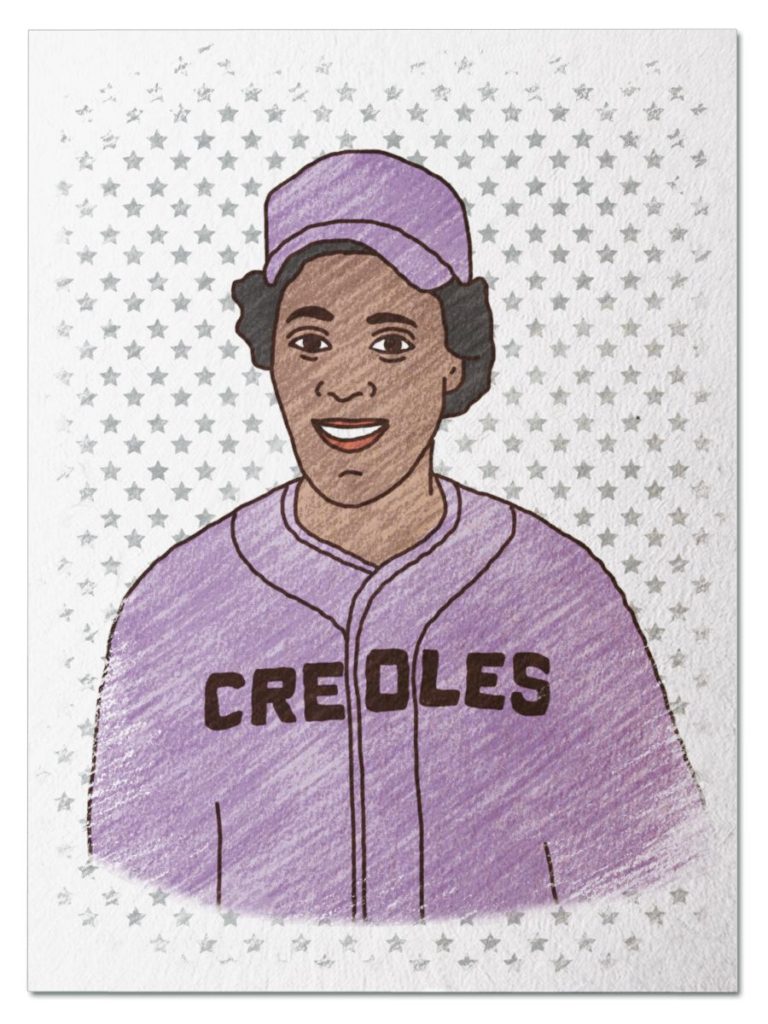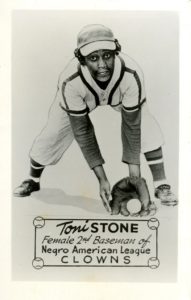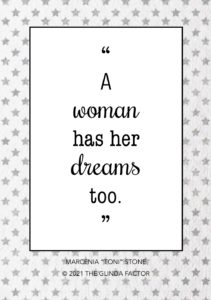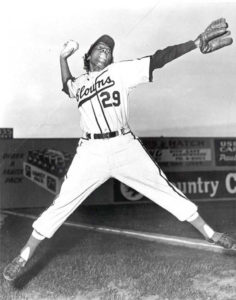
Awesome Athlete
She could play almost any sport as a young girl, but felt most at home on a baseball diamond. She played every chance she got, even though she was always the only girl on the team. Through grit and determination, she became the first woman to play professional baseball in the Negro American League. Travel to spring training in 1953 and meet Toni Stone…
Her Ruby Shoe Moment
The Power of the Wand
Her Yellow Brick Road
Brains, Heart & Courage
Glinda’s Gallery
Just the Facts
Her Ruby Shoe Moment
Toni Stone was surprised when she stepped off the airplane in Washington DC. A group of reporters waited at the airport to take her photograph and document her arrival. It was April,1953 and Toni Stone was reporting for spring training with the Indianapolis Clowns — she was the first woman to play professional baseball in the Negro American League.

Negro Leagues Baseball Museum
Toni was hired to replace Hank Aaron, who had played for the Clowns in 1952. Within a few months, Aaron’s talent attracted the attention of major league scouts. And he made history by joining the Boston Braves.
The year before, Toni had left baseball when she got married. But she couldn’t say “no” to the Clowns’ offer. She jumped at the opportunity to return to the game and play in the major leagues. It was a dream come true!
The day after Toni arrived in Washington DC, her picture was featured in local Black newspapers with the caption “Toni Arrives!” And the crowds grew as she got closer to Norfolk, Virginia — televisions scouts, film crews, baseball representatives, and women from all walks of life.
In part, signing Toni was a publicity stunt by the Indianapolis Clowns. The owner invented facts about her to generate interest and sell tickets. They even asked her to wear a skirt (the professional women’s uniform), but she refused. It was the men’s regulation uniform or nothing.
 Toni had a great season at second base. Her batting average was around .243 and she specialized in making double plays. People were impressed that she could hold her own among the men. In many ways, Toni brought much needed publicity and revenue to the Negro League.
Toni had a great season at second base. Her batting average was around .243 and she specialized in making double plays. People were impressed that she could hold her own among the men. In many ways, Toni brought much needed publicity and revenue to the Negro League.
It wasn’t an easy road, however. Toni gathered critics as well as fans. The other baseball players (including her teammates) resented her. Some of them harassed her. Others ridiculed her. And she was routinely excluded from dinners and other team events. She stood tall in the face of taunts and jeers from players and fans, however because she wanted to play baseball.
Toni signed with the Kansas City Monarchs for the 1954 season. However, she sat on the bench quite a bit. And her game suffered. So Toni retired from professional baseball and returned home to California. She continued to play semi-professional baseball and coach a neighborhood baseball team until she was 65 years old.
The Power of the Wand
Toni fought both racism and sexism to follow her dream of playing professional baseball. And she has inspired hundreds of women and girls to do the same. For example, 12-year-old Ella Bruning was the only girl to compete in the 2021 Little League World Series. She was the starting catcher for the Wylie Little League team from Abilene, Texas — AKA “Ella and the Fellas.” Ella is only the 20th girl to ever play in the Little League World Series.
Her Yellow Brick Road
Marcenia “Toni” Stone moved to San Francisco, California to be with her sister, Bunny, in 1943. She lived in the Fillmore neighborhood, which was sometimes called the “Harlem of the West.” She worked odd jobs to help with the War effort, including driving trucks at the dockyards. She also used the opportunity to reinvent herself — she changed her name to Toni Stone and shaved 10 years off her age.
Toni met Aurelious Pesci (AP) Alberga at a jazz club in Fillmore. He was fascinated by her story and wanted to help her play baseball again. So AP paved the way for Toni to play with the American Legion AH Wall Post 435 team.

Toni Stone (Negro Leagues Baseball Museum)
Within a year, Toni joined a semi-professional team in the Peninsula Baseball League. Then, she heard about a new league called the West Coast Negro Baseball Association. She tried out for the San Francisco Sea Lions and became the only woman on the team. The WCNBA folded fairly quickly, but the Sea Lions refused to give up. They became a traveling team, barnstorming from around the country from South Dakota to Louisiana. And they were successful, winning over 150 games in 1948.
It was a time of big change in baseball— Jackie Robinson had broken the color barrier in the major leagues in 1947 when he joined the Brooklyn Dodgers. Another change in baseball was the rise of women’s teams, especially in the All-American Girls Professional Baseball League. Toni wasn’t welcome, however, because she was a Black woman.
Toni did well at the Sea Lions, playing both center field and second base. She played all the innings she could and became a novelty — people came to the stadium to see the “Sensational Girl Player.” Then, she was recruited by the New Orleans Creoles in 1949 and moved to the Jim Crow South. She played for two seasons and began to get noticed. She improved her batting average to almost .300 and got more playing time.
Then, Toni abruptly took a break to get married. It was a surprise to everyone. Even more surprising, her new husband asked her to quit baseball. And she did. But she couldn’t stay away.
Brains, Heart & Courage
Marcenia grew up with 3 siblings and a lot of extended family in the Rondo neighborhood of St. Paul. When she was 10 years old, her family left West Virginia as part of the Great Migration. They moved to Minnesota in search of a better life. They found a house near other family members who migrated from different parts of the South. Her parents started a barber shop together — Boykin’s Barber and Beauty Shop — on West 7th Street in St Paul.
Marcenia was an amazing athlete from an early age and could play almost any sport — football, basketball, golf, tennis, hockey, figure skating, and swimming. But her favorite was baseball. And she played with the neighborhood boys every chance she got. Before long, her nickname was “Tomboy Stone” (her parents weren’t very happy about that).
 Marcenia didn’t like school. She had a hard time concentrating in class and fell behind academically. So she transferred to Hammond Junior High, a special education school in St. Paul, which hurt her self confidence. She continued to excel in athletics, however, and lettered in three sports (track, high jump, and diamond ball). Then she dropped out of high school when she was 19 years old and never received a high school degree.
Marcenia didn’t like school. She had a hard time concentrating in class and fell behind academically. So she transferred to Hammond Junior High, a special education school in St. Paul, which hurt her self confidence. She continued to excel in athletics, however, and lettered in three sports (track, high jump, and diamond ball). Then she dropped out of high school when she was 19 years old and never received a high school degree.
Father Charles Keefe, the priest at her church, invited Marcenia to play on the church’s baseball team, which was part of the Catholic Boys League. She made the most of the experience, even though the boys didn’t accept her and the coaches ignored her. After four years on the Catholic team, she went in search of new opportunities and convinced the St Paul Men’s Meat Packing League to let her play with them. In fact, she played pick up games with so many different teams that she lost track.
Marcenia taught herself the rules of the game through reading books and attending as many baseball games as she could. She lived close to Lexington Park, where the Saint Paul Saints played back then. She loved to watch games and analyze the plays. She also convinced the Saints’ manager, “Gabby” Street, to allow her to train in his baseball clinics. Gabby became her mentor and bought Toni her first pair of cleats.
When she was 16 years old, Toni joined the local semi-pro baseball team — the Twin Cities Colored Giants. It was an all-male, all-Black team. She traveled all over the midwest and Canada and played any position they needed. And she loved it.
Glinda’s Gallery
Just the Facts
- Marcenia “Toni” Lyle was born on July 17, 1931 in West Virginia. Her family moved to St. Paul when she was 10 years old.
- Toni played with the following teams over her career: American Legion AH Wall Post 435 team (1943-1945); Peninsula Baseball League (1946-1948); San Francisco Sea Lions (1949); New Orleans Creoles (1949-1952); Indianapolis Clowns (1953); Kansas City Monarchs (1954).
- On December 23, 1950, Toni married Aurelious Pesci (AP) Alberga, who was 38 years older than she (he was 67 and she was 29).
- In 1990, Toni was included in two exhibits at the National Baseball Hall of Fame and Museum in Cooperstown — “Women in Baseball and “Negro Baseball League.” She was also featured at the Negro Leagues Baseball Museum in Kansas City and the City of Baseball Museum at CHS Field in St Paul.
- In 1993, Toni was inducted into the International Women’s Sports Hall of Fame.
- March 6, 1990 was declared “Toni Stone Day” in St. Paul, Minnesota.
- Toni died in Oakland, California on November 2, 1996 at 75 years old.
- In 2019, Toni’s life was featured in Toni Stone, an off-Broadway play written by Lydia Diamond.
- A neighborhood baseball field in St. Paul was re-named “Toni Stone Field” in her honor.
Want to Know More?
Ackmann, Martha. Curveball : the remarkable story of Toni Stone the first woman to play professional baseball in the negro league. Chicago: Lawrence Hill Books, 2010.
Gregorich, Barbara. Women at Play: The Story of Women in Baseball. San Diego: Harcourt, Brace, & Co, 1993.
Jones, Wendy. Stone, Marcenia Lyle (Toni), 1921–1996. MNOpedia.org (https://www.mnopedia.org/person/stone-marcenia-lyle-toni-1921-1996)
